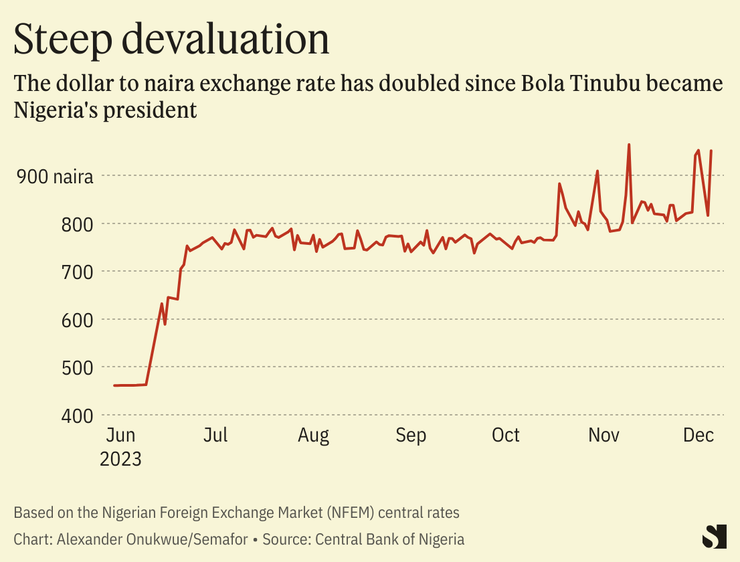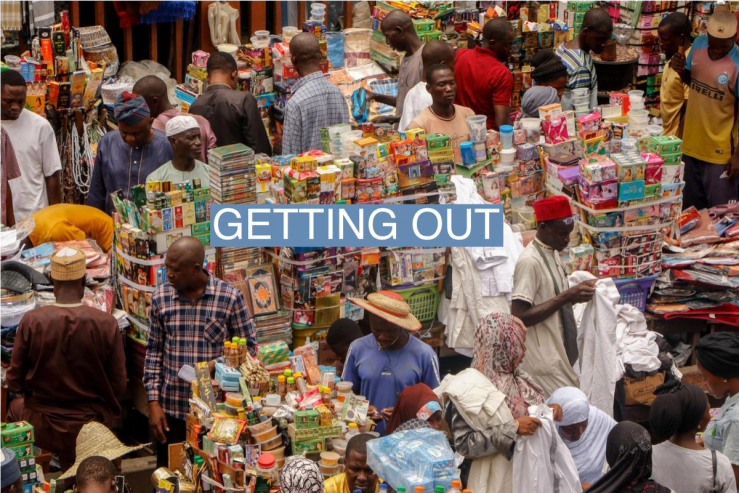The News
LAGOS — Multinational companies are cutting back their presence in Nigeria or pulling out altogether as currency problems hamper their operations and hurt consumers.
Procter & Gamble, an Ohio-based consumer goods giant, last week became the latest big company to scale down its operations. It said it will stop producing its care and hygiene products in the continent’s most populous country.
P&G’s chief financial officer Andre Schuten said tough macroeconomic conditions, particularly the local naira currency’s weakness, is driving the shift. Nigeria is “very difficult for us as a U.S. dollar-denominated company to create value” in, Schuten said at Morgan Stanley’s Global Consumer and Retail Conference, an investor event in New York.
British multinationals GSK and Unilever are two other high profile consumer goods companies to have announced changes to their Nigeria operations this year. Each signaled forex pressures as fueling decisions to shift to a third party distributor model (in GSK’s case) or retire the production of well-known products (as Unilever announced in March). In September, another British group, PZ Cussons, said “foreign exchange challenges” was causing it to delist from the Nigerian stock market.
“Nigeria is a $50 million net sales business,” Schuten said, “a really small” market in the context of the company’s global net sales of $85 billion. P&G products, like diaper brand Pampers and laundry powder Ariel, will now be available in Nigeria on an import-only basis.
Know More

Nigeria’s naira has weakened sharply against the dollar since President Bola Tinubu initiated reforms in June to cancel fixed exchange rates while inflation reached an 18-year high in July, rising to 27.33% in October.
But even before Tinubu’s term, many of the largest companies in Nigeria, from cement producer Dangote to telecoms leader MTN, reported that the macroeconomic conditions had hit their earnings. New York-listed e-retailer Jumia and venture capital-funded startups that report earnings in dollars have noted similar challenges this year.
P&G began doing business in Nigeria in 1992 with production centered in two plants located in towns close to Lagos. In 2017 it opened a multimillion-dollar baby care products manufacturing plant but it was shuttered a year later in a “restructuring” attempt aimed at efficiency and sustainability due to difficulties in sourcing inputs.
Nigeria’s central bank governor, Yemi Cardoso, in a recent speech on his policy approach, said low forex inflows from declining oil revenues was a major cause of the country’s challenges, though he blamed the dollar’s strength and inflation in emerging markets on the effects of the war in Ukraine and the COVID-19 pandemic. He said the bank has taken actions over the past two months to achieve price stability, including a 108 billion naira ($136 million) sale of treasury bills. His response to industry concern around postponed monetary policy meetings was that the bank has fulfilled legal requirements to meet at least four times a year and was, in any case, reviewing the meetings’ value for efficiency.
Alexander’s view
Market withdrawals by P&G, PZ, GSK and Unilever, whose presence in Nigeria span generations with brands that consumers associate with an assurance of quality and middle class life, is raising anxiety. Fears are growing over Nigeria’s capacity to hold foreign investors’ attention and retain thousands of jobs amid high levels of poverty. A volatile economy and internal security challenges pose “a really difficult environment to thrive” for large companies with limited flexibility to change long-established production standards, says Oluebube Nwosu, a consumer goods analyst at Lagos-based firm Vetiva Capital.
Schulten, explaining P&G’s rationale for ceasing production in Nigeria, challenged a narrative that Nigerian entrepreneurs and defenders of government policy sometimes hold to always be true: that a country of 200 million people is a market foreign investors feel they must be active in. P&G is also cutting back in Argentina, a similarly inflationary economy but one where it has built a $400 million business around 46 million people, making it a more vital part of the business than Nigeria.
Shifts to import-only operations by P&G, GSK and other companies offering essential goods could worsen Nigeria’s inflation problems by “putting pressure on domestic price stability,” says Bolade Agboola, energy and consumer goods analyst at Chapel Hill Denham, an investment bank in Lagos. Should P&G’s products become more expensive in Nigeria, local competitors will increase their prices too, Agboola said.
Room for Disagreement
Olaniyi Yusuf, managing partner at advisory firm Verraki Partners, expects that Nigeria’s currency fluctuations will compel producers to “really focus on research and development and innovation to find local substitutes” for their products and supply chain.
It’s a line of argument that strategic shifts by P&G and other Western multinationals, while aggravated by macro conditions, are driven by disruption and competition by nimble entrants from developing economies like India and Turkey. Pampers, the popular P&G brand, reportedly ceded leading market share over half a decade ago to a competing diaper brand by Turkish company Hayat Kimya which launched in Nigeria in 2015 and has a $100 million plant. In other words, the exit of established multinationals “might be an opportunity for leaner models, smaller businesses that are more agile,” said Nwosu, of Vetiva.
The View From Kenya
Unilever Kenya increased the share of production inputs sourced locally from 23% in 2019 to 50% this year after building on a strategy adopted in response to the supply chain shake-up caused by the COVID-19 pandemic, managing director Luck Ochieng told Kenyan newspaper The Star. It plans to source 7.6 billion Kenyan shillings ($49.5 million) worth of inputs from the Kenyan market by 2025.
But rising costs of fuel and electricity, and a “hostile” tax regime are making Unilever’s cost of production in Kenya “a bit of a challenge,” even as consumers shift to “cheaper products,” Ochieng said.
Notable
- Otsuka, a Japanese pharmaceutical company, marked the beginning of construction for a $50 million factory in Ogun, southwest Nigeria in November. It hopes to source 80% of its materials in Nigeria to produce Pocari Sweat, a sports drink popular in Japan especially in hot weather.


